By: debbie lynn elias
It’s been 28 years since the movie world was rocked by John Milius’ RED DAWN. Beloved to the point of cult status today, RED DAWN proved a springboard for some actors who would become some of Hollywood’s hottest talents – Patrick Swayze, Jennifer Grey, Charlie Sheen, Lea Thompson and C. Thomas Howell. So, now in 2012 we have to ask the question – Can lightning strike twice and why would anyone dare touch a property that is so precious to so many? For producers Tripp Vinson and Beau Flynn, and director Dan Bradley, the answer is a resounding “yes” and with that in mind, in 2009 lensed a reboot of RED DAWN. Calling on the youthful talents of Josh Peck, Isabel Lucas, a pre-Hunger Games Josh Hutcherson, Connor Cruise, pre-Friday Night Lights Adrianne Palicki and a pre-Thor/Avengers Chris Hemsworth, together with veterans Brett Cullen and Jeffrey Dean Morgan, RED DAWN finally hits screens with explosive action that showcases not only the talents of the cast, but the skills of director Dan Bradley.
While in Los Angeles for the recent press tour for RED DAWN, Vinson, Flynn and Bradley fielded questions from a host of journalists, including myself, not only about the reboot, but Bradley’s transition from an action driven 2nd unit director to helming his first feature.
Where did this idea for a remake or reboot originate?
Beau Flynn (BF): This was Tripp [Vinson] and I who pursued it. It was one of those movies that’s part of your fabric as a producer. We were 13 years old when we saw the movie and it was a dream to fight for your hometown and that’s what the theme of this movie is – “Fight or Flight”. So we refer to it all the time in development meetings. It [came] up all the time with actor and director, etc. When MGM was under new regime, because we had pursued the rights earlier for RED DAWN., we immediately called them and said, “We are making RED DAWN.” They were like, ‘It’s not really on our slate. It’s being kind of put aside right now.” And we went in there and pitched them and they gave us the rights and let us go and put a writer on and put Dan [Bradley] on and go ahead and make the movie. It’s pretty cool. It still is a little bit dreamlike to be the producers to reboot this movie.
How much did you retain of the original film and how much did you make it “new”?
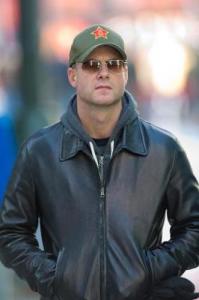
Tripp Vinson (TV): I wouldn’t say we approached it from a percentage. It’s much more organic than that. You start with, “What are you trying to accomplish? Why are you telling the story?” Once we found our way into that, you develop the script and you look for moments. To be honest with you, there were scenes that were in and out of this script up to the very end. One in particular was the scene where Chris Hemsworth and Josh Peck are out looking over the mountains and they’re talking about the losses they’ve sustained. That was a scene actually in the original movie. We didn’t have that in our script until probably a week or two before we started shooting. It just felt like we needed another moment between the boys to show that they’re working together and not at odds. That’s a nice scene.
BF: There were two ways to look at it. There were those scenes which propelled the story and then there were iconic moments as well and we wanted to be true to that. And again, there was a lot of discussion about that, about the moments from [the original] RED DAWN that were relevant to us. The ones we also really looked for are the ones that would hold up today in 2012 now. For instance, the deer blood, the deer hunting scene. That’s a scene that’s relevant. That’s a coming of age scene. That’s a scene that’s relevant 80 years ago, 30 years ago and now today in terms of playing that prank. And even in the midst of these guys surviving, you would still play that prank on the younger kid in Josh Hutcherson. That’s a very real moment. And that moment was also kind of in and out in the cut of the film and it’s a moment that the audience absolutely loves even though it’s not a big set piece. It’s just real human moment.
TV: That’s a great scene to reference also when you’re doing a reboot because that scene was in the original movie, but we changed it obviously. We play it differently than it was played in the original. So it’s nice to look for those opportunities when you can pay homage to the original but put your own stamp on it.
MSD: Do you find yourselves, Dan as a director, and to you Beau and Tripp as producers, that having somebody like Dan [Bradley] coming off such a strong stunt and action background and stepping in to helm a film like RED DAWN with common sensibility and styling of stunts, is a strong consideration when picking a director for a film like this?
TV: Of course. Absolutely. That’s actually in some ways a huge advantage and obviously something you consider. But that wasn’t the concern. The concern was, “Can Dan do everything?” What was so great, obviously, was the experience that he had, he was able to step and handle development of the script, performances, post-production on the movie, making it breathe and live and not just be action scene, action scene, action scene. It’s a luxury in some ways. The action was – I assumed that was going to be great. But are we going to have all the elements working. It was really fun to do it with Dan and see him step up and be able to pull that off.
BF: I’ll be really honest about it. Tripp and I knew we developed a good script . We knew the movie in and out. We knew we’d be able to put a good cast together. With Dan what was so exciting was we knew that Dan would bring the ability to shoot a great movie and bring great practical action sequences. But what was really, really surprising was his development skills and his ability to come in and understand story. At our first meeting we sat down around the table, he really came in and had a lot of strong, radical ideas which, at first, we butted heads and then we eventually found a place that definitely made the movie better. So that was very, I think, surprising for both of us. And Tripp’s right. Dan was able to bring the whole package.
MSD: Did you have any concerns Dan that you would be able to deliver the complete package in terms of story, working with the actors?
Dan Bradley (DB): Honestly, this is an opportunity that I’ve been working for my entire career so I put myself up under a lot of pressure. But I also found it something I really wanted to accomplish. My own personal mission on the movie was I wanted the action, and when a character got injured or was killed, I wanted it to mean something, I wanted people to feel something in the audience and that was what was my central focus. I was confident that I could do the action but I really wanted the action to have emotional stakes.
When the film was written and shot, you had China attacking the United States. What made you switch everything – including looping in the North Korean dialogue in post-production – from China to North Korea?
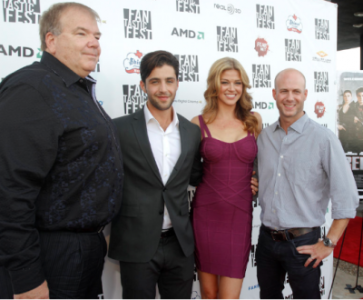
BF: China attacking the United States had a lot of limitations to it. Luckily for us, we accounted for a lot of those limitation in the construction of the story which is why we have Russians who provide air and naval support. . .Is it that hard to buy the North Koreans? Yea, maybe it is, but John [Milius] had Cubans in the original movie and the way we looked at it was “Is it so crazy that if John was able to justify Cuban troops in the US in the original movie, is it so hard to believe that we could get away with North Korean troops in the US?” I obviously don’t think it is that hard to see.
BF: [I]n the original construction of the story, the story that you saw is basically the same story that was done with the Chinese. We did a lot of research on the limitations of the Chinese military, so we accounted for those. The story devices like EMP, the Russians involvement, etc., were all accounted for because of the limitations of the Chinese military. It just so happened that the North Korean military is lesser than the Chinese so those story points worked well to justify the way North Koreans would be involved in this as well.
DB: Frankly, despite all of the discussion and back and forth between Korea and China, the thing that was most important to me was the story about these kids fighting back and figuring out how to deal with this situation. For me personally, the specific identity of the invaders wasn’t a driving force. And the movie’s not political. It’s really just, “How do these kids deal with this situation they find themselves in.” It’s a story about them as opposed to a story about this other entity.
MSD: Dan, from a practical standpoint, how did you prepare to shoot this? Did you storyboard, shot list, how did you work with your production guys because you’ve got some massive build-outs going on?
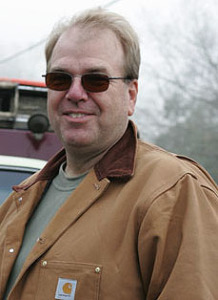
DB: I shot list. Throughout my entire second unit career and all those action sequences I wrote and directed, I sit down and write out the sequence and then I think of very shot and do a list.
TV: It’s a producers’ dream because as we were developing the script, Dan would be like, “I’m gonna give you guys a sequence.” I thought it would be a page or a bullet point and then you’d get like 15 pages from Dan. It’s so dense and so meticulous and you realize that’s why he’s so successful. It’s one of those things where it looks very effortless but really when you see behind the scenes, it was very very impressive.
MSD: How did you go about deciding the armory and the weaponry that you use?
DB: It was part of the research we did. They’re not gonna be able to carry all [these] heavy weapons and stuff with them initially. So, with this leading edge that does the invasion, we just decided that they would commandeer National Guard vehicles and whatever kind of vehicles they found on the ground. That’s really most of the equipment we have that they’re using in this small part of the war.
Any scenes with only one take?
DB: Oh yea. I could only blow up one house. [laughing] We had a few things. I’m used to shows where if it doesn’t work out, let’s do it again. And this is like “No, this is it.” It was on an almost daily basis.
TV: The chase scene that you guys did, the whole police building, all of that with the tank coming in and the fight and jumping through windows, that was done in no time.
BF: Canteen explosion – that was a whole building that we blew up.
TV: A lot of these movies have a 40-50 day second unit helmed by someone like Dan. We didn’t have that. It was all first unit so it all fell within the confines of the production. That’s very unique.
DB: That was one of my big jobs because I’m used to doing these huge movies where I have 20 days to do a car chase. In this situation, it’s “Okay. I’ve got 3.” But I see it the same way. The images in my head are the same. Just have to figure out how to aggressively get it done.
Is it exciting now to see the film finally come out after sitting on the shelf for 3 years?
DB: It’s kind of unbelievable. For a long time, I just had to not think about it. We worked incredibly hard. We broke every production record MGM has ever had as far as how many set-ups a day we would do. We really worked incredibly hard. To have those financial problems that were so outside our control impact the film in such a way was heartbreaking. Frankly, there was a year and a half period where I just had to stop thinking about it because it was killing me.

Because of the delay, is it a plus that you now have a couple of stars in this film, namely Chris Hemsworth and Josh Hutcherson?
DB: It’s the irony of the RED DAWN world. The original spawned a bunch of stars and we didn’t get to come out when [the film] was finished but we still spawned a bunch of stars. I’m very proud of our cast.
BF: Honestly – and I give Tripp a ton of this credit – with most producers I guarantee you that this movie probably would have died probably 8 or 9 times along the way. Very few movies survive in terms of regime change, bankruptcy, new regimes, other kind of political issues that we had, and then ultimately to end up coming out on Thanksgiving on over 2500 screens is a huge deal for this movie. Certainly, I know with Tripp, there was never an option that this movie was not coming out globally. He was like a Pit Bull
TV: It’s exciting. It’s been an exhausting experience. I’m curious to see if the theory about RED DAWN and remaking RED DAWN holds true which is that, was it successful and did it mean so much because of the time it was released and the world it was released in, or is there a bigger story, a more universal story that is a reason why it was successful. The whole approach of the movie is the idea that it’s more about the fantasy about fighting for your country and becoming a hero. It’s an underdog story. I’m curious to see if it resonates.
BF: My biggest wish for the movie is that there’s a lot of nostalgia factor with this title. It has some serious fans, a serious fan base and people in their 30’s and 40’s. But I really pray that 13 year olds like when Tripp and I first saw this movie, that it has that kind of impact in terms of wanting to fight for your home. It has nothing to do with politics. It’s just being kind of brave and being a soldier for your family at a high school age. That’s pretty intense and I just feel that that’s something I hope can be passed down.
TV: There’s one thing about this version and I think it is better in some ways is that, having to make the changes that we made freed us up a bit. We set the movie on an alternate time line. The original was very much present day. One of the things I felt after seeing [this version] the first time with the changes was that, because the world we set the movie in was a much darker, scarier place, a lot of things we put in the title sequence actually happened – Kim Jon Lee dying, etc. Hopefully it allows you to take a little distance from it and go with the fantasy of what this movie is instead of being so regimented about what’s really going on in the world today and can this be possible.
A big difference between the original and this reboot is how the Wolverines come together.
DB: I really wanted to feel that these kids were making choices that felt reasonable motivated. Again, for me, I had this over-urging goal that I think there are a lot of entertaining action films made today but you’ll watch them and watch and astronomical body count and it makes you feel nothing. I really hope that when people watch this and see one of these kids injured or killed that it means something. That some young person sitting in the audience sees that and understands on an emotional level that there is a cost and its painful.
BF: That was a big discussion about bringing the kids together and making it feel real. I was adamant about getting “avenge me” in the movie, but Dan was like, “there’s nothing to avenge. The Dad is dead.” He was right. Dan was right to have that impetus happen very early and that triggers the revolution and I think that’s what makes it feel so real.
MSD: Dan, now that you’ve completed this film and you see the light at the end of the tunnel and coming to release, what have you taken away and learned about yourself in this process?
DB: It’s a long list. [laughing] I frankly learned that being a first unit director is a much harder job than I ever imagined. But I do have a talent for hard work. That’s all I kinda do – I just go after it harder.
MSD: Will we see you helm another film in the future?
DB: I hope so. There are a few things that I’m working on right now.
TV: The problem is he’s never available. Every giant movie locks him up for second unit work so that’s the trickiest part.
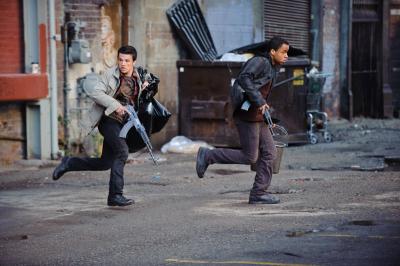
MSD: There are so many scenes that take your breath away and make your heart stop. Do each of you have a favorite scene in the film?
BF: My two favorite scenes are – I think Dan did an amazing job with Tom Eckert’s [Bret Cullen] death – that scene with the boys in the wood. My favorite scene though is probably the call back to when Matt is up on the humvee and he’s giving the speech and he’s reiterating the same thing that Jed said earlier in the movie. I personally loved that. That was another scene we had really early on.
DB: SPOILER ALERT: One of my favorite moments in the movie is not an action scene. After Jed’s [Chris Hemsworth] been killed and they pull up in the woods and discover that Connor’s character has a [tracking] implant. This brave kid figures out what to do and the rest of them just can’t imagine how they’re gonna deal with this after the loss of Jed and suddenly this problem…and this kid volunteers [to throw himself to the wolves].
TV: For me personally, the invasion sequence. That sequence is so ingrained in my head from the original and seeing it 100 times. You think of the scale of that sequence is so small in the back of the school. Then to kind of inject steroids with Dan’s muscular version of it, that sequence is pretty awesome. . . In the post 9/11 world that we all live in, globally anything can happen right now. That’s just really the reality of the world we live in. Crazy things can happen. It’s just one of those things that feels very terrifying and not to take anything for granted.
Adding another layer to the film is the music.
DB: We went a little bit old school. We decided to have a thematic score. Underlining the emotional beats. I hope people are stunned when Jed gets shot. I hope people are blown away and feel Josh Peck’s pain when his dad gets shot.
BF: Finding the right balance of pushing it to get an emotion, it’s a trick. You can really push the music and you’re going to elicit emotion. Finding the right balance of where that should be so you’re not pushing too hard is something that’s tricky in a movie like this. You want to show some restraint, otherwise it cheapens it a little bit.
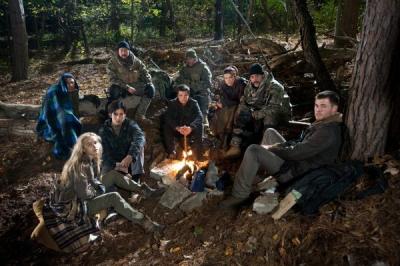
MSD: As producers, you have a wide range of projects. Beau, you’ve done Choke and Hatfields and McCoys. Tripp, The Guardian. You’ve co-produced Journey to the Center of the Earth, the upcoming Battle of the Year with Josh Peck What do you look for in a project? Action seems to be a big love, but what do you look for in a project?
BF: I know Tripp is going to say story, for sure, and characters that relate to a feeling, and I agree with that, too. But I think we’re in a world now where I think you have to work from concept and then great characters and great story. I feel like if you don’t have some kind of concept, you can’t elevate, at least from a theatrical point of view for a global release, which are the movies we like to make and we want millions of people to see our film. I don’t think you have much of a chance if there’s not a real concept. Then within that concept you infuse your story skills, development skills, bring on a great director like Dan whose at the top of their game in that genre, and then get really fine actors around it. I just feel like that’s the only way you can cut through. But with that concept, there also has to be some theme in there, something that you connect to, the way that we both connected to RED DAWN.
TV: Concept, sure. But I also think in terms of the story, are there elements of the story that have universal appeal. What is about the story that people are going to respond to? Why are you telling this story? Honestly, when it comes to action and those types of things, I think we’re both really attracted to that. Doing these types of movies is incredibly challenging and it’s kind of the most fun because they’re so complex, particularly this one. Making this movie was really difficult and it was really fun.
#












